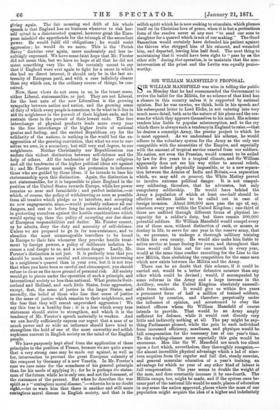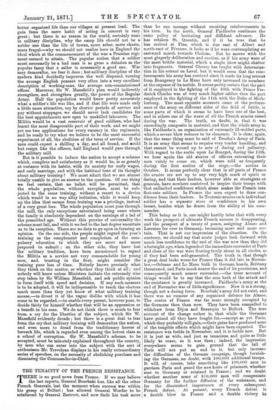SIR WILLTAM MANSFIELD'S PROPOSAL.
SIR WILLIAM MANSFIELD was wise in telling the public on Monday that he had recommended the Government to revive the ballot for the Militia, for no scheme of that kind has. a chance in this country unless it is supported by national opinion. But he was unwise, we think, both in his speech and his subsequent letter to Lord Elcho, in not entering into very much more detail, both as to the nature of his plans and the rea- sons for which they approve themselves to his mind. His scheme renders him liable to popular misconception, and to the cry which there is always such a tendencyin England to raise,—that he desires a conscript Army, the precise project to which he is most opposed. As we understand his scheme, he would adhere to the voluntary system for the Army as the only one compatible with the necessities of the Empire, and especially with the amount of tropical service exacted from our soldiers.. No nation, not even the Prussian, would consent to be exiled by law for five years to a tropical climate, and Sir William apparently does not see his way either to annual reliefs, which are indeed physically impossible, or to a new separa- tion between the Armies of India and Britain,—a separation which, we may add en passant, the White Mutiny proved to involve extreme political danger. It is not compul- sory soldiering, therefore, that he advocates, but only compulsory soldiership. He would have behind the Army a population of which at least one-half should be effective soldiers liable to be called out in case of foreign invasion. About 300,000 men pass the age of, say, nineteen every year within the United Kingdom ; one-third of these are unfitted through different forms of physical in- capacity for a soldier's duty, but there remain 200,000 potential soldiers. Sir William Mansfield would compel every one of these men, without distinction of rank, or means, or destiny in life, to serve for one year in the reserve army, that is, we presume, to undergo a thorough military training within his own county. He would also make him liable to active service at home during five years, and throughout that time would call him out for one month in every year, would at the same time confine recruiting for the Line to the new Militia, thus abolishing the competition for the same men which now exists between the Militia and the Army.
There can be no doubt that this scheme, if it could be carried out, would be a better defensive measure than any other which could be devised ; would, if accompanied by some reforms in the Army and a large increase in the Artillery, render the United Kingdom absolutely unassail- able from without. It would give us within five years a permanent force of half a million of trained soldiers, organized by counties, and therefore perpetually under the influence of opinion, and accustomed to obey the- trained officers whom Sir William Mansfield of course. intends to provide. That would be an Army amply sufficient for defence, while it would cost directly very little and indirectly nothing at all. The pay might be any- thing Parliament pleased, while the gain to each individual from increased efficiency, manliness, and physique would be full compensation for the necessary loss of one year's time.. To the working-classes more especially this gain would be enormous. Men like Sir W. Mansfield are much too silent upon a fact which, nevertheless, they thoroughly recognize,— the almost incredible physical advantage which a lad of nine- teen acquires from the regular and full diet, steady exercise, and general muscular education of a year's training, an advantage for which no year of any other kind of labour is full compensation. The year seems to double the weight of the men, and does constantly increase it by one-fourth. The Militia camps, too, might be made, and if the system once be- came part of the national life would be made, places of education in any sense the nation approved, places where the mass of our population might acquire the idea of a higher and indefinitely better organized life than our villages at present lead. The gain from the mere habit of acting in concert is very great ; but there is no reason in the world, certainly none in military discipline, why the camp life should not be a nobler one than the life of towns, more sober, more chaste, more frugal—why we should not realize here in England the ideal which at the commencement of the war a Prussian regi- ment seemed to attain. The popular notion that a soldier must necessarily be a bad man is as gross a delusion as the popular fancy that a sailor is necessarily a good one. War may demoralize, we fear it does ; but military discipline of the modern kind decidedly improves the well disposed, turning the average English peasant very often into a very excellent description of working-man, the average non-commissioned officer. Moreover, Sir W. Mansfield's plan would indirectly strengthen, and strengthen greatly, the power of the Regular Army. Half the population would know pretty accurately what a soldier's life was like, and if that life were made only a little more attractive, say by shorter periods of service and pay without stoppages, we should never lack candidates for the best appointments now open to unskilled labourers. The Militia would be a vast reservoir of good soldiers, who had learnt the most disagreeable part of their work, and we might yet see two applications for every vacancy in the regiments, and be ready to try what we believe to be the most successful experiment of all, the abolition of the term of service. If the men could expect a shilling a day, and all found, and Gould but resign like the officers, half England would pass through the military mill. But is it possible to induce the nation to accept a scheme which, complete and satisfactory as it would be, is so greatly at variance with its habits, with its anxiety for early wages, and early marriage, and with the habitual tone of its thought about military training ? We must admit that we are almost totally unable to give an answer to the question. Of one thing we feel certain, that no ballot will be permitted, that the whole population, without exception, must be sub- jected to the same training, without a resort to a device which would in no way allay irritation, while it would keep up the idea that escape from training was a privilege, instead of a very great loss. The whole population must pass through the mill, the only exceptions entertained being cases where the family is absolutely dependent on the earnings of a lad of the prescribed age. Without this proviso of universality the scheme must fail, and with it we feel to the last degree uncertain as to its reception. There are no data to go upon in forming an opinion. On the one side, the people might regard the year's training as the complement and completion of the com- pulsory education to which they are more and more prepared to submit ; on the other side, they have lost the military tradition, have been accustomed to regard the Militia as a service not very commendable for young men, and, trusting in the fleet, might consider the training pure loss of time. Nobody knows precisely what they think on the matter, or whether they think at all ; and nobody will know unless Ministers imitate the extremely wise step taken by Sir William Mansfield, and ask public opinion to form itself with speed and decision. If any such measure is to be adopted, it will be indispensable to teach the electors much more than they yet know of what military training means,—to divest it of the vague dislike with which it has come to be regarded,—to enable every parent, however poor, to decide fairly for himself whether that will be an oppression or a benefit to his sons. We do not think there is much to fear from a cry for the liberties of the subject, which Sir W. Mansfield evidently dreads ; but there is a great deal to fear from the cry that military training will demoralize the nation, and even more to dread from the traditionary horror of barrack life, which is regarded even among the lowest class as a school of corruption. Sir W. Mansfield's scheme, to be accepted, must be minutely explained throughout the country, by men who can enter into the subject with the sort of enthusiasm Mr. Trevelyan displays in his really extraordinary series of speeches, on the necessity of abolishing purchase and dismissing the Commander-in-Chief.































 Previous page
Previous page